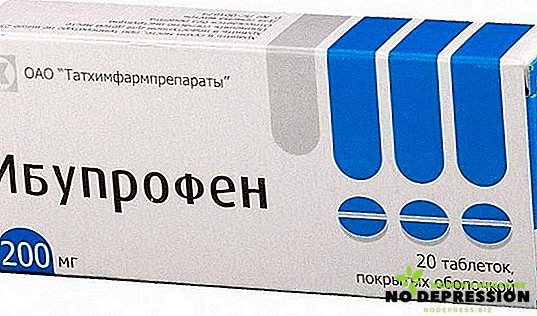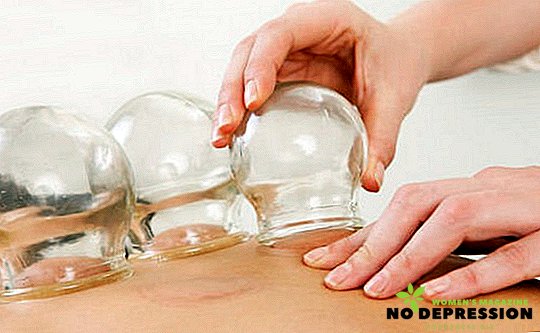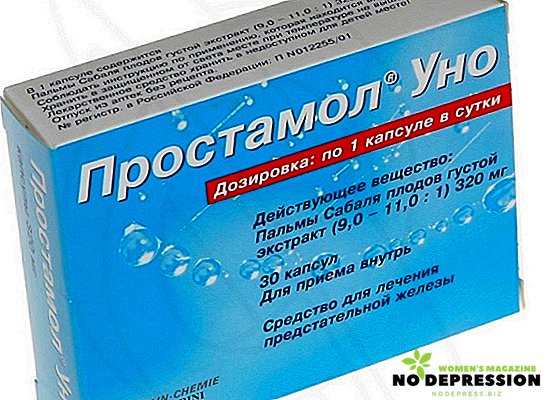Ibuprofen is a non-steroidal anti-inflammatory drug, a derivative of propionic acid. It has an analgesic, antipyretic and anti-inflammatory effect on pharmacological properties. Blocks cyclooxygenase 1 and 2 and inhibits prostaglandin synthesis. The analgesic effect of the drug is not a narcotic type.

It was first introduced into practice in 1969 in the UK. Today it is included in the list of the most important drugs of WHO and in the list of essential drugs in the Russian Federation.
Application area
The drug Ibuprofen successfully affects many diseases. For ease of use available in different dosage forms.
When used orally will help with:
- Inflammatory and degenerative pathologies of the musculoskeletal system: rheumatoid and psoriatic arthritis, osteoarthrosis, acute gout, spondylosis, ankylosing spondylitis, Barre-Lieu syndrome (vertebral compression of the vertebral artery).
- Pain: lumbago, sciatica, thoracic radicular syndrome, myalgia, neuralgic amyotrophy, neuralgia, arthralgia, ossalgia, bursitis and other inflammations, sprains, bruises, traumatic inflammation of soft tissues and joints, postoperative pain, migraine, headache, dental pain, post surgical operations in the mouth.
- Fever of various etiologies (including after vaccinations).
- In infectious and inflammatory diseases of the respiratory system: tonsillitis, pharyngitis, rhinitis, bronchitis, pelvic inflammation, adnexitis, algomenorrhea, panniculitis, nephrotic syndrome.
 Rectal (candles) is used in children 3 months-2 years old:
Rectal (candles) is used in children 3 months-2 years old:
- As a febrifuge for infections with high fever, incl. post-vaccination.
- As an anesthetic for weak and moderate pain (migraine, neuralgia, headache, toothache, otitis, sore throat, sprains).
Ointments and gels for external use are prescribed:
- For the treatment of inflammatory and degenerative changes of the musculoskeletal system: rheumatoid and psoriatic arthritis, articular syndrome with rheumatism and gout, osteochondrosis with radicular syndrome, ankylosing spondylitis, hip and thoracic periarthritis, deforming osteoarthrosis, arches, ischemic osteoporosis .
- For muscle pain, injuries - sprains, sprains, muscle and ligament ruptures, bruises, soft tissue swelling.
Release form and composition
Pills
Ibuprofen tablets have a light pink or pink color, round biconvex and smooth surface. The main active ingredient, ibuprofen, accounts for one tablet 0.2 g.
Also there are auxiliary components: magnesium stearate, potato starch, colloidal silicon dioxide, beeswax, gelatin, dye, povidone, sodium hydroxycarbonate, vanillin, sucrose and others.
Blisters of 10 tablets packed in a cardboard box of 1, 2 or 5 pieces.
Gel
Ibuprofen gel is suitable for external use. Colorless or light yellowish, transparent, with a specific smell. The content of ibuprofen is 0.5 g.

Auxiliary components: propylene glycol, ethanol, carbomer 940, lavender oil, dimexide, triethanolamine, methyl parahydroxybenzoate, neroli oil, purified water. Available in aluminum tubes weighing from 20 to 100 g. Released without a prescription. Shelf life - 24 months.
Ointment
Ibuprofen ointment is dispensed in a metal tube or glass container with a volume of 25 g, in cardboard packaging with instructions. Ibuprofen ointment contains 5% of the active ingredient - ibuprofen. Additional ingredients: ethyl alcohol, propylene glycol, triethanolamine, carbomer, lavender oil, water.
Faceplate
Ibuprofen-Faspi "- white tablet, coated, capsule-shaped, with a risk. Contains additional components: L-arginine, sodium bicarbonate, crospovidone, magnesium stearate, hypromellose, sucrose, titanium dioxide, macrogol 4000.
Hemofarm
Ibuprofen-Hemofarm is produced in the form of tablets with different amounts of the basic substance: 0.2 and 0.4 g. Auxiliary: microcrystalline cellulose, a derivative of starch, silicon dioxide, stearic acid.
Also available as effervescent tablets containing ibuprofen and DL-lysinate - 342 mg. Additional components: sodium carbonate, sodium dihydrocitrate, povidone K-25, sugar substitutes, lemon flavor, soda, simethicone emulsion.
Instructions for use
Pills
Ibuprofen tablets are prescribed orally to adults and children over 12 years old at 0.2 g 3-4 p. / Day. For accelerated action, the dosage can be raised to 0.4 g (2 tab.) 3 p. / Day. With the manifestation of therapeutic effects daily intake of Ibuprofen is reduced to 0.6-0.8 g.
The remaining receptions are distributed throughout the day, after meals. Maximum - 1.2 g per day (no more than 6 tablets). The break between receptions is at least 4 hours.
The duration of taking Ibuprofen without consulting a doctor is no longer than five days. Do not give to children under 12 years old without a doctor's prescription.
At the age of 6 to 12 years: 1 tablet no more than 4 p. / Day. The drug can be prescribed when the weight of the child is above 20 kg, with a daily dose not higher than 0.3 g / kg of weight. Pause must be at least 6 hours.
Outwardly course is 2-3 weeks. For adults, the maximum dose orally or rectally per day is 2.4 g.
Ointment and gel
For back pain, Ibuprofen is recommended as an ointment. In this form, the active components act directly on the center of pain, bypassing the digestive tract organs, without loading the liver and kidneys. It is obligatory to consult a doctor before using the medicine.
Ibuprofen gel is indicated for various inflammatory and degenerative pathologies: radiculitis, rheumatism with pain syndrome, ankylosing spondylitis, exacerbation of gout, osteochondrosis with radicular syndrome, as well as with myalgia, bursitis, tendinitis, and tenovaginitis, lumbago, trauma, hysterogyroidism, trauma, myalgia, bursitis, tendinitis, and tenovaginitis, lumbago, trauma, and cramps.
The drug is applied to the sore spot with small strips and rubbed until completely absorbed. It is recommended that a gradual application of the remedy in order to avoid unpleasant sensations (burning, etc.) is recommended.
Contraindications and side effects
Unfortunately, the effect of Ibuprofen is not selective. Therefore, reducing the inflammatory response, it negatively affects the mucous membrane of the stomach and intestines, liver and kidneys, causes a spasm of the bronchi and worsens blood coagulation. The side effect does not depend on the brand.
With caution you need to use the drug for liver and kidney diseases, chronic heart failure, dyspepsia, bleeding in the gastrointestinal tract and diseases of the gastrointestinal tract in history, immediately after surgery, with allergies to NSAIDs.
With regular use is required to systematically monitor the work of the liver and kidneys, blood count.
Do not apply on damaged skin.
Among the adverse events are the following symptoms:
- The digestive system: often manifests discomfort in the epigastrium, nausea, vomiting, diarrhea, anorexia; possible erosions and ulcers of the digestive tract; less often - bleeding in the digestive tract; sometimes - a malfunction of the liver (with prolonged use).
- CNS and peripheral nervous system: often - dizziness, headaches, agitation, sleep disorders, decreased visual acuity.
- Hematopoietic system (with long-term administration): anemia, thrombocytopenia, agranulocytosis.
- Urinary system (with prolonged use): possible abnormalities in the kidneys.
- Allergy: more often - skin rash, angioedema; less commonly, aseptic meningitis (with concomitant autoimmune events), bronchospastic syndrome.
- Local reactions (for external use): may cause hyperemia, burning or tingling on the skin.
 Ibuprofen is contraindicated: during exacerbation of erosive and ulcerative processes in the gastrointestinal tract, pathologies of the optic nerve, aspirin asthma, problems with blood formation, serious malfunctions of the kidneys and liver, hypersensitivity to the drug, during pregnancy in the 3rd trimester of pregnancy.
Ibuprofen is contraindicated: during exacerbation of erosive and ulcerative processes in the gastrointestinal tract, pathologies of the optic nerve, aspirin asthma, problems with blood formation, serious malfunctions of the kidneys and liver, hypersensitivity to the drug, during pregnancy in the 3rd trimester of pregnancy.
In the first two trimesters, admission is acceptable if the benefit to the mother is higher than the risk to the fetus. Ibuprofen is excreted in breast milk. Single admission during breastfeeding is possible with pain and fever.
With long-term use or high doses of Ibuprofen (more than 0.8 g / day), it is recommended to stop breastfeeding.
What is the difference between Nurofen or Ibuprofen
Preparations Nurofen and Ibuprofen contain the same active ingredient. The difference is only in the dose of ibuprofen in the tablet. Ibuprofen is available in tablets of 0.2 g. Nurofen tablets have a dosage of 0.2 0.4 and 0.6.
Nurofen retard (prolonged action) - 0.8 g per pill. Nurofen plus - additionally contains codeine (for cough). Nurofen for children is made in the form of syrup, suspension and chewable tablets.
Significant difference between drugs in price: Ibuprofen is several times cheaper than Nurofen. The manufacturer of Nurofen is in Italy, Spain and the UK. And Ibuprofen is produced in Russia, Belarus and Estonia. The corresponding difference in the cost of transportation and advertising.
There is also American-made Ibuprofen, which would be significantly more expensive, but it is practically not imported.
Which is better: Paracetamol or Ibuprofen
According to the results of clinical trials, it has been observed that Ibuprofen reduces the temperature faster than Paracetamol, and its effect lasts longer (about 6-8 hours compared to 4-6 for Paracetamol). Paracetamol can be given to a child from an earlier age.
Paracetamol is, on average, more effective for headaches and joint pains, and Ibuprofen for spasms during menstruation. With a sore throat, the effect of the drugs is the same. As an anti-inflammatory agent, Ibuprofen helps better with sinusitis, acute ear pain, muscle and tooth pain, and lower back pain.
An overdose of Paracetamol can cause serious damage to the liver, especially with simultaneous use of alcohol. Long-term use of Ibuprofen can damage the kidneys, increase the likelihood of heart attack and stroke.
The likelihood of side effects in Paracetamol is small, except for allergies. Ibuprofen, as already known, provokes heartburn, diarrhea or constipation, heaviness in the stomach and is dangerous for patients with ulcerative lesions of the gastrointestinal tract.
Due to its pharmacological properties and effectiveness, Ibuprofen is widely used to reduce pain and combat high fever in patients.
Despite the fact that the drug is released without a prescription, consultation with a specialist is obligatory before taking. For any side effects, you must stop treatment and go to a health facility.
Reviews
I think Ibuprofen tablets are an economical option when compared with Nurofen (10 pcs. - 140 rubles). 30 Ibuprofen tablets cost 70 rubles. Round, hard tablets are swallowed easily enough. The taste is not bitter, if not chewed.
Anna, 28 years old, Tula
Recently, soaked and cold. It was treated for a long time, everything is over, except for a headache. Mom advised Ibuprofen, and it really helped. The main thing that acts very quickly and the pain goes away for a long time.
Tanya, 19 years old, Yelets
Ibuprofen take more than one year. It helps me with headaches and in women's days. I drink one or two pills, depending on how much it hurts. Even with severe pain helps in half an hour. I am attracted by price and quality. As side effects are indicated violations in the gastrointestinal tract. I have them, if you have to take a long time.
Claudia, 36 years old, Voronezh












